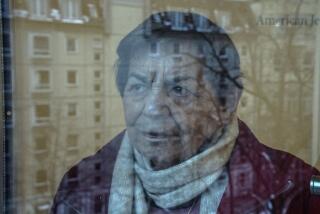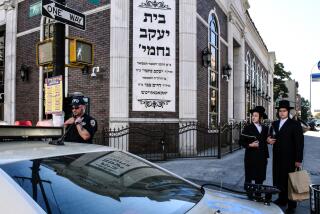Jewish Community Enjoying a Renaissance in Russia, Group Says
- Share via
MOSCOW — Anti-Semitism in Russia is on the wane, and synagogues, Hebrew schools and Jewish community centers are sprouting up again in scores of small towns and villages, said officials at the largest congress of Jewish communities in the country since before the 1917 Revolution.
The two-day Congress of Jewish Communities of Russia, which ended Tuesday, was a chance to showcase what organizers called a remarkable renaissance of Jewish life. Berl Lazar, the chief rabbi of Russia, said local Jewish organizations finally are taking root and flourishing after having been suppressed during the 74 years of Communist rule that ended in 1991.
“It is impossible to count all the miracles that are happening,” Lazar said. “Today we see Jewish schools, Jewish kindergartens, charity canteens, various cultural programs and lots of music and artistic groups in towns where Jewish life had not existed at all.”
Avraham Berkowitz, executive director of the Federation of Jewish Communities of the Commonwealth of Independent States--a reference to a post-Communist grouping of most former Soviet republics--said delegates from about 145 Jewish communities went to the congress. The number of officially registered communities serving the country’s estimated 1 million Jews has doubled in just the last two years, he said.
In addition to the 400 or so delegates at the congress held in the recently opened Moscow Jewish Community Center, Russian Culture Minister Mikhail Y. Shvydkoi and an envoy of President Vladimir V. Putin attended the meeting, along with representatives of the Muslim community and the Russian Orthodox Church.
In his opening speech, Lazar pointed to Putin’s positive attitude toward Jewish life as one key factor helping to increase religious tolerance in Russia. Putin has undertaken a number of symbolic acts to show his backing for the Jewish community, such as lighting a national menorah last Hanukkah.
The improved atmosphere means that “thousands and thousands of Jews who didn’t want to admit that they were Jews and who even made a secret of the fact now are proud to say, ‘Yes, we are a part of the Jewish community, and we want to participate,’ ” Lazar said. “An organized Jewish life exists in Russia, and it’s not a virtual thing anymore.”
Lazar noted that unlike in the past, when Russian Jews who wished to practice their faith actively sought visas to move to the United States, Israel or Germany, many Jews now feel that they can remain comfortably in Russia. “Jews want to stay here and live like a community in any other country,” he said.
Berkowitz said the number of Jews emigrating from the countries of the former Soviet Union had peaked in 1990 and stood at about 1,000 a month now.
Lev Leviev, chairman of the Federation of Jewish Communities, said it was a success for Russian Jews that Putin during his state visit to the United States this month went out of his way to make contact with American Jewish organizations.
Despite the improvements in the state’s attitude toward Jewish life, there are still periodic hate crimes recorded, such as the desecration of Jewish cemeteries and places of worship. Officials at the congress also expressed concern about a spate of recent attacks by neo-Nazi skinheads against members of other minorities, particularly African students and immigrants from the Caucasus and Central Asian regions.
Zinovy Kogan, chairman of the Congress of Jewish Religious Communities and Organizations of Russia, said by telephone Tuesday that he would not exaggerate the decline in nationalist hatred.
“We are glad that Putin sent a message to the Congress of Jewish Communities gathering and that the government was represented there, but we would be even happier if those responsible for the recent pogroms [against other minorities] were brought to justice as soon as possible--so that people of all nationalities could feel safe in Moscow and in other towns.”
*
Yakov Ryzhak of The Times’ Moscow Bureau contributed to this report.
More to Read
Sign up for Essential California
The most important California stories and recommendations in your inbox every morning.
You may occasionally receive promotional content from the Los Angeles Times.










